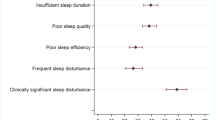Abstract
Background
Our study analyzes the incidence of sleep problems and their mediating role on depression and anxious preoccupation in patients with resected, non-advanced cancer.
Methods
A multi-institutional, prospective, observational study was conducted with 750 participants of 14 hospitals in Spain. Participants’ socio-demographic and clinical characteristics were collected using a standardized self-report form and using EORTC QoL-QLQ-C30, BSI, Mini-MAC questionnaires.
Results
In women, sleep problems, depression and anxious preoccupation were observed in 65, 41 and 21%, respectively. In men, sleep problems, depression and anxious preoccupation were reported in 51, 29 and 61%, respectively. More sleep problems, depression and anxious preoccupation were found among women than males. Depression was a significant predictor of anxious preoccupation. In males, sleep problems partially mediated this association. This was not confirmed in women.
Conclusion
Our findings point toward the importance of developing interventions that decrease depression and sleep problems in cancer.

Similar content being viewed by others
References
Jimenez-Fonseca P, Calderon C, Carmona-Bayonas A, Muñoz MM, Hernández R, Mut Lloret M, et al. The relationship between physician and cancer patient when initiating adjuvant treatment and its association with sociodemographic and clinical variables. Clin Transl Oncol. 2018;20(11):1392–9.
Bower JE. Behavioral symptoms in breast cancer patients and survivors: fatigue, insomnia, depression, and cognitive disturbance. J Clin Oncol. 2008;26(5):768–77.
Loh KP, Zittel J, Kadambi S, Pandya C, Xu H, Flannery M, et al. Elucidating the associations between sleep disturbance and depression, fatigue, and pain in older adults with cancer. J Geriatr Oncol. 2018;9(5):464–8.
Costa-Requena G, Gil F. The mental adjustment to cancer scale: a psychometric analysis in Spanish cancer patients. Psychooncology. 2009;18(9):984–91.
Innominato PF, Spiegel D, Ulusakarya A, Giacchetti S, Bjarnason GA, Lévi F, et al. Subjective sleep and overall survival in chemotherapy-naïve patients with metastatic colorectal cancer. Sleep Med. 2015;16(3):391–8.
Howell D, Oliver TK, Keller-Olaman S, Davidson JR, Garland S, Samuels C, et al. Sleep disturbance in adults with cancer: a systematic review of evidence for best practices in assessment and management for clinical practice. Ann Oncol. 2014;25(4):791–800.
Mota DD, Pimenta CA, Caponero R. Fatigue in colorectal cancer patients: prevalence and associated factors. Rev Lat Am Enferm. 2012;20(3):495–503.
Aaronson NK, Ahmedzai S, Bergman B, Bullinger M, Cull A, Duez NJ, et al. The European Organization for Research and Treatment of Cancer QLQ-C30: a quality-of-life instrument for use in international clinical trials in oncology. J Natl Cancer Inst. 1993;85(5):365–76.
Derogatis LR, Melisaratos N. The brief symptom inventory: an introductory report. Psychol Med. 1983;13(3):595–605.
Grassi L, Buda P, Cavana L, Annunziata MA, Torta R, Varetto A. Styles of coping with cancer: the Italian version of the Mini-Mental Adjustment to Cancer (Mini-MAC) scale. Psychooncology. 2005;14(2):115–24.
Zhou ES, Clark K, Recklitis CJ, Obenchain R, Loscalzo M. Sleepless from the get go: sleep problems prior to initiating cancer treatment. Int J Behav Med. 2018;25(5):502–16.
Van Onselen C, Paul SM, Lee K, Dunn L, Aouizerat BE, West C, et al. Trajectories of sleep disturbance and daytime sleepiness in women before and after surgery for breast cancer. J Pain Symptom Manage. 2013;45(2):244–60.
Vin-Raviv N, Akinyemiju TF, Galea S, Bovbjerg DH. Sleep disorder diagnoses and clinical outcomes among hospitalized breast cancer patients: a nationwide inpatient sample study. Support Care Cancer. 2018;26(6):1833–40.
İzci F, Sarsanov D, Erdogan Zİ, İlgün AS, Çelebi E, Alço G, et al. Impact of personality traits, anxiety, depression and hopelessness levels on quality of life in the patients with breast cancer. Eur J Breast Health. 2018;14(2):105–11.
Ohrnberger J, Fichera E, Sutton M. The relationship between physical and mental health: a mediation analysis. Soc Sci Med. 2017;195:42–9.
Acknowledgements
The authors would like to thank the investigators of the NEOcoping study, the Supportive Care Working Group of the Spanish Society of Medical Oncology (SEOM), Natalia Cateriano, Miguel Vaquero and IRICOM S.A. for the support of the website registry, and Priscilla Chase Duran for editing the manuscript.
Funding
This work was funded by the Spanish Society of Medical Oncology (SEOM) in 2015. The sponsor of this research has not participated in data collection, analysis, or interpretation, in writing the report, or in the decision to submit the article for publication.
Author information
Authors and Affiliations
Corresponding author
Ethics declarations
Conflict of interest
The authors have declared no conflict of interest.
Ethical approval (research involving human participants and/or animals)
The study has been performed in accordance with the ethical standards of the Declaration of Helsinki and its later amendments. This study is an observational, non-interventionist trial.
Informed consent
Signed informed consent was obtained from all patients.
Additional information
Publisher's Note
Springer Nature remains neutral with regard to jurisdictional claims in published maps and institutional affiliations.
Rights and permissions
About this article
Cite this article
Calderon, C., Carmona-Bayonas, A., Hernandez, R. et al. Incidence of sleep problems and their mediating role on depression and anxious preoccupation in patients with resected, non-advanced cancer: data from NEOcoping study. Clin Transl Oncol 21, 1104–1107 (2019). https://doi.org/10.1007/s12094-018-02018-2
Received:
Accepted:
Published:
Issue Date:
DOI: https://doi.org/10.1007/s12094-018-02018-2




